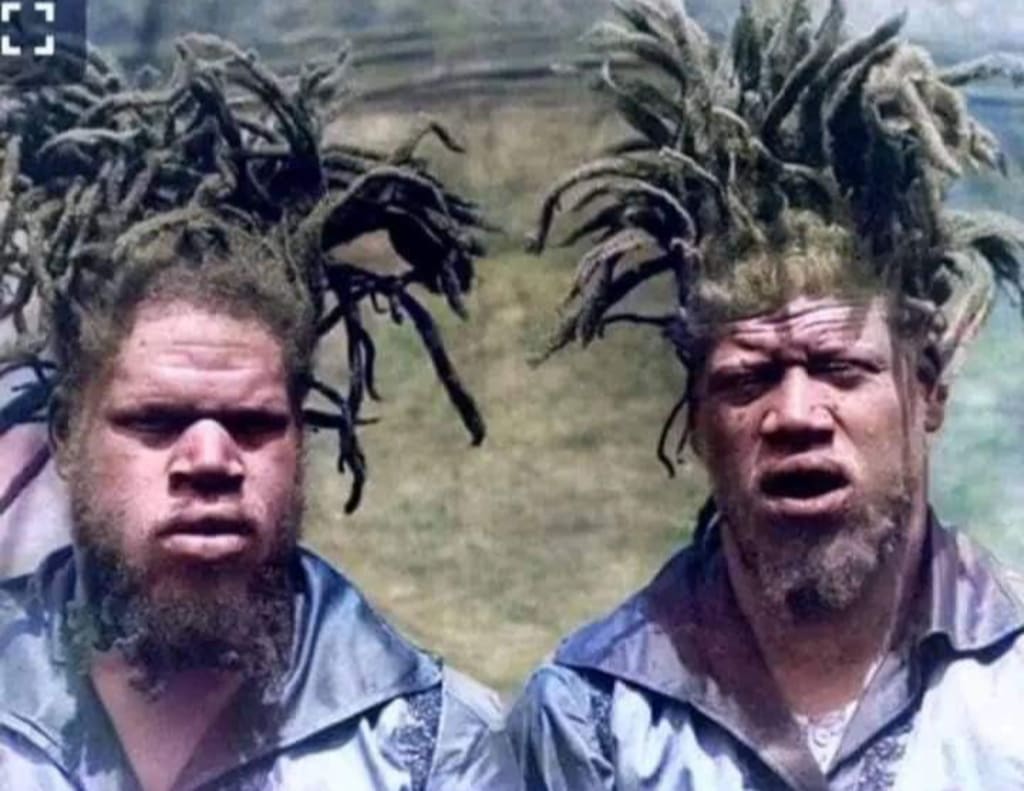The Remarkable Story of the Muse Brothers: From Captivity to Freedom
Captivity to Freedom

In the American history, the story of George and Willie Muse, known as the Muse Brothers, stands out as a poignant tale of exploitation, resilience, and eventual reunion. These two albino brothers, born in the 1890s in Roanoke, Virginia, were grandsons of former slaves and sons of tobacco sharecroppers. Their lives took a dramatic and tragic turn in 1899 when they were kidnapped by bounty hunters in Truevine, Virginia, and forced into a life of performing as "freak show" exhibits in circuses. This blog post delves into their extraordinary journey, the trials they endured, and their ultimate triumph.
Early Life in Truevine, Virginia
George and Willie Muse were born to a humble family in Truevine, Virginia, a small rural community. Their albinism, characterized by their white skin and bluish eyes, set them apart in their predominantly African American community. Despite the challenges of their condition, the Muse brothers lived a relatively normal life, helping their parents with tobacco farming.
However, their distinct appearance soon caught the attention of bounty hunters and circus recruiters, who saw them as valuable attractions for the burgeoning sideshow industry. In 1899, the brothers' lives were irreversibly altered when they were kidnapped and thrust into a world of exploitation and deceit.
Life in the Circus
Upon their capture, George and Willie Muse were falsely informed that their mother had died and that they would never return home. Stripped of their identities and freedom, the brothers were thrust into the harsh and often cruel world of circus sideshows. They were forced to grow their hair into massive dreadlocks, which, combined with their albinism, made them unique attractions. They were exhibited under various dehumanizing names such as "Eko and Iko," "The White Ecuadorian Cannibals," and "The Ambassadors from Mars."
The Muse brothers were displayed as rarities, their albinism and hair exploited to draw crowds. They traveled across the United States and even internationally, performing in front of fascinated audiences who were unaware of the brothers' tragic backstory. The circus promoters, including the infamous Ringling Brothers, reaped significant financial gains from their exploitation, while George and Willie received nothing.
Enduring Exploitation
The Muse brothers' lives in the circus were marked by continuous exploitation and abuse. They were denied an education, proper medical care, and the basic freedoms that most people take for granted. Isolated from their family and any semblance of a normal life, they endured years of mistreatment. Despite the grim circumstances, George and Willie developed a remarkable resilience and maintained a strong bond with each other, which helped them survive their ordeal.
Their plight drew occasional attention from concerned individuals, but the circus industry was powerful, and efforts to free the brothers were met with resistance. The Muse brothers' situation was a glaring example of the broader exploitation and racism that was rampant in the United States during this period.
The Road to Freedom
The turning point in the Muse brothers' lives came in 1927, nearly three decades after their abduction. During a circus performance in Roanoke, Virginia, their mother, Harriet Muse, recognized them. Defying the odds, she confronted the circus promoters and demanded her sons' release. Her persistence and unwavering love for her children led to a legal battle that eventually resulted in the brothers' freedom.
Harriet Muse's determination to reunite with her sons highlighted the enduring strength of familial bonds and the power of a mother's love. The legal victory was not only a personal triumph for the Muse family but also a significant moment in the fight against the exploitation of vulnerable individuals in the circus industry.
Life After the Circus
After gaining their freedom, George and Willie Muse returned to a semblance of normal life. They reunited with their family and settled in Roanoke. Despite the years of hardship, they retained a sense of dignity and resilience. The brothers continued to perform in circuses, but this time on their own terms, ensuring they were fairly compensated for their work.
Their story eventually gained widespread attention, serving as a powerful reminder of the exploitation faced by many individuals in the circus and sideshow industries. It also highlighted the systemic racism and discrimination that African Americans and people with disabilities endured during this era.
Legacy and Reflection
The story of the Muse brothers is a testament to the human spirit's capacity to endure and overcome adversity. Their journey from captivity to freedom is a powerful narrative that underscores the importance of perseverance, family, and justice. The brothers' legacy continues to inspire and educate, shedding light on a dark chapter of American history.
Their tale has been immortalized in various forms, including the book "Truevine: Two Brothers, a Kidnapping, and a Mother's Quest: A True Story of the Jim Crow South" by Beth Macy. This detailed account provides a comprehensive look at the brothers' lives and the broader social context of their story.
In conclusion, George and Willie Muse's story is one of unimaginable hardship and remarkable resilience. Their journey from the fields of Truevine to the sideshow tents of America, and finally back to their family, is a narrative of love, courage, and the unyielding human spirit. The Muse brothers will always be remembered as symbols of the fight against exploitation and the enduring power of familial love.
About the Creator
Enjoyed the story? Support the Creator.
Subscribe for free to receive all their stories in your feed. You could also pledge your support or give them a one-off tip, letting them know you appreciate their work.






Comments (1)
Wow! Yes, the side shows were barbaric!